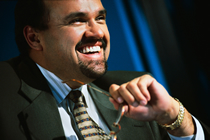|
When
delegates from racial equality councils in England, Scotland
and Wales came together at a conference entitled
Racial Equality Councils: Securing Our Future, on
Wednesday 25 April 2001 at the Council House in Birmingham,
they resolved to set up a national British body of racial
equality councils and partnerships based upon Scotland,
Wales and the regions of England. The new body was to be
overseen until it was underway by a representative steering
committee.
The
Commission for Racial Equality committed itself at the same
conference to negotiate with the new British Federation of
Race Equality Councils on proposed changes to the salaries,
conditions and pensions of race equality council staff.
The
founding conference was initiated by Waqar Azmi, the then
Chief Executive of Worcestershire Racial Equality Council,
supported by officers of Race Equality West Midlands.
Every effort was made to involve race equality councils from
different regions of England and the countries of Scotland
and Wales.
Speakers at
the founding conference were Milton Crossdale, Director,
Nottingham and District Racial Equality Council, Jazz
Iheanacho, Director, Race Equality First, Cardiff, Maggie
Chetty, Senior Community Relations Officer, West of Scotland
Community Relations Council, John Azah, Director, Kingston
Racial Equality Council, Dave Purdey, Vice Chair of the MSF
(now Amicus) Race Relations Group, Mukami McCrum, Director,
Central Scotland Racial Equality Council, and Waqar Azmi,
the driving force behind the conference. All were in favour
of a new national organisation, but opinions varied as to
its functions.
Focus group
facilitators were Mr Paul Crofts, Director, Wellingborough
District Racial Equality Council, Faruk Desai, Director,
Preston and Western Lancastershire Racial Equality Council,
Dr Cyriac Maprayil, Director, Tower Hamlets Racial Equality
Council, Anne Matin, Director, Norwich and Norfolk Racial
Equality Council, Anita Kumari, Director, Warwick and
District Racial Equality Council, and Mr Amu Devani,
Director, Charnwood Racial Equality Council.
Towards the
end of the proceedings, Mr Andrew Housley, Acting Chief
Executive of the Commission for Racial Equality, apologised
for the absence of the CRE chair, went on to welcome the
proposal for a new body to represent race equality councils,
but pointed out the urgent need for RECs to modernise their
approach and adapt to changing circumstances.
The
conference discussed various models for the proposed
national organisation, with most delegates recognising the
advantages of one based on English regional, and Scottish
and Welsh, forums nominating to a national executive. This
had the advantage of bridging the distance between the local
and national, and ensuring regional variations were
accommodated. It also differed considerably in structure
from the failed National Association of Race Equality
Councils, which has been riven by political dissension. The
official report of the founding conference was compiled by
Frank Reeves of Race Equality West Midlands.
The first
national chair of was Waqar Azmi who, on leaving the
voluntary sector race equality movement, was replaced by
Milton Crosdale. When Milton Crosdale announced his
retirement at the Stoke Rochford national conference, John
Azah took over the leadership. Since March 2007, the chair
has been Amir Kabal.
From its
inception, has tried hard to fulfil its capacity-building
brief for the voluntary equality movement but has been
unsuccessful in its application to the CRE and National
Lottery for funding. It has had to rely entirely on the
voluntary support and contribution of its member
organisations.
In
addition, in the seven years of its existence, has found
itself subject to periodic changes of political climate,
sometimes welcomed and sometimes neglected by the Commission
for Racial Equality and the Home Office, as opinion
fluctuated on the continued need for local voluntary race
equality councils. In the final days of the Commission for
Racial Equality, under the leadership of the Chair, Trevor
Phillips, more supportive relationships were forged. Since
the inception of the Equality and Human Rights Commission
and the coming into being of the Department for Communities
and Local Government and the Government Equalities Office, a
great deal of effort has been invested by all parties in
explaining positions and developing mutually supportive
partnerships in furtherance of the promotion of local
equalities. The Federation was finally registered as a
company limited by guarantee in 2007 under the name
Federation of Race Equality Councils Ltd.
(Top)
|








